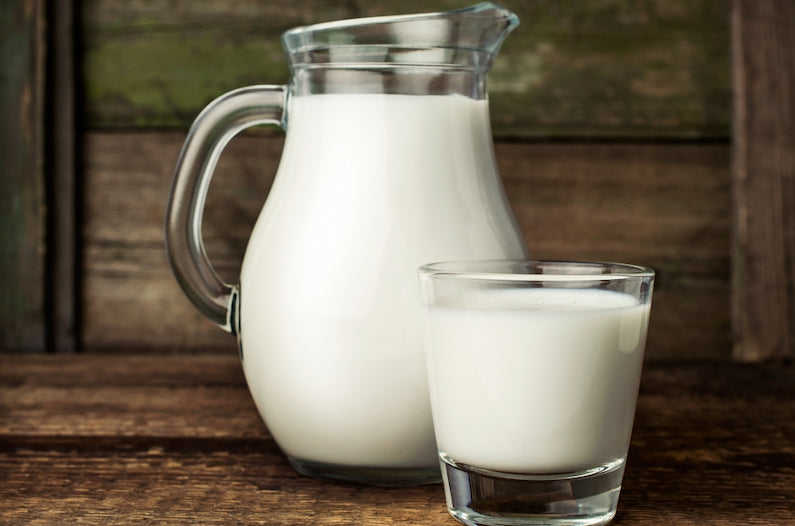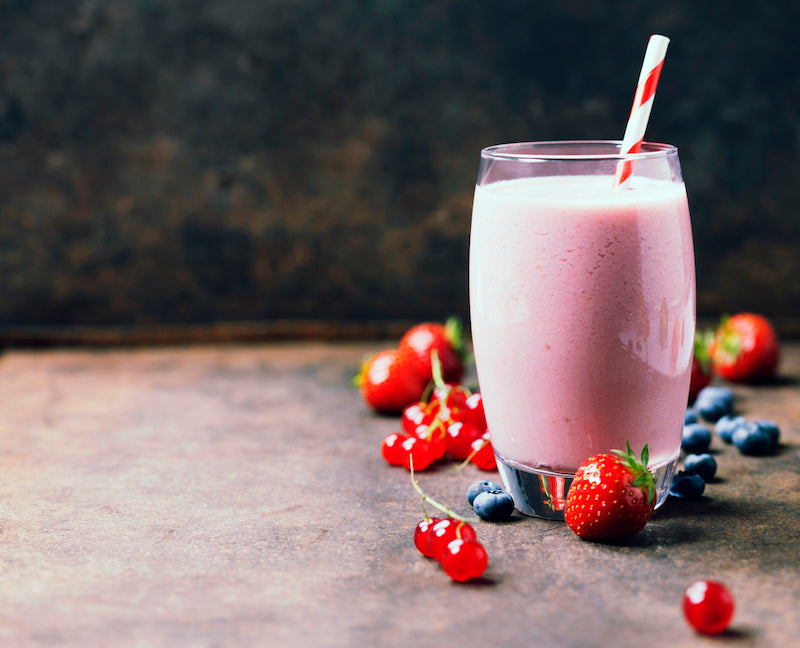If you're currently taking whey protein concentrate, or whey protein isolate, you might be wondering if you've chosen the correct supplement for your nutrition goals.
When it comes to whey protein concentrate vs isolate, the biggest difference is how it is processed and the final nutrient profile of each supplement. Keep reading for more on the best form of whey protein for you to take.
Key Takeaways: Whey Protein Concentrate vs Isolate
-
Whey protein concentrate is around 80% protein, the rest is made up of carbs, fats, and other nutrients.
-
Whey protein isolate is usually 100% whey protein with no other macros.
-
Both types deliver all nine essential amino acids.
-
Whey protein isolate is usually better for those who are lactose intolerant.
-
Whey protein isolate also has higher protein density per serving and calorie.
-
Both whey protein concentrate and isolate provide all three branched chain amino acids.
Why People Take a Whey Protein Supplement
Protein supplements can be a great way to increase your protein intake and support your fitness goals. It can be difficult to get enough protein with just food when you're trying to build lean muscle mass.
That's why protein powders are so popular in the fitness community. But there are so many different kinds of protein powder available that it can be hard to know which one is right for you.
Is there one that's better for before or after a workout? Is there one that's best for building muscle or losing weight?
If you've ever found yourself asking these questions, keep reading to learn about one of the most popular types of protein used in supplements, whey protein.
How is Whey Protein Made?

Whey protein is used in many protein supplements, including bars, powders, and drinks.
Both whey protein isolate and concentrate come from cow's milk. It makes up about 20% of the protein in milk, and casein makes up the other 80%.
Whey is the liquid portion of cow's milk that remains during the process of making cheese and yogurt. Whey contains proteins that are quickly digested and absorbed by the body.
Have you ever taken yogurt out of the fridge to find liquid floating on top?
Don't dump this out in the sink! The liquid is whey protein.
Stir the yogurt until the liquid is fully incorporated to get all the protein.
Because whey is quickly digested, it is the G.O.A.T. when it comes to protein for building muscle.
There are several different types of whey, but whey isolate and whey concentrate are the most commonly used in supplements.
But whey protein isolate and concentrate are produced through different processing methods, and they have slightly different nutritional values.
So, what's the main difference between whey protein concentrate and isolate?
As we mentioned above, the main difference between whey isolate and whey concentrate is the way they are processed.
Since the methods used in their processing are different, each of these types of whey has a different nutritional value.

Whey Protein Isolate vs Whey Protein Concentrate: Processing
After the liquid whey is separated during the cheese-making process, it goes through additional processing to increase its protein content.
After the whey is processed, it is dried to the form of powder called whey isolate which contains about 80% protein. Some methods of processing can produce a product that contains up to 90% protein by weight.
The other 10-20% that remains after processing is whey concentrate. Unlike whey protein isolate, whey concentrate contains carbohydrates and fats alongside protein.
Whey protein isolate and concentrate both contain the same essential amino acids, including branched chain amino acids.
They are both made from the same protein (milk), so they are both complete proteins, providing all nine essential amino acids.
Best Whey Protein for Lactose Intolerance
In addition to having fewer carbohydrates and fat, whey protein isolate is also lower in lactose than whey isolate. If you are lactose intolerant or sensitive to lactose, opting for a whey isolate can prevent any symptoms of lactose intolerance.
Regardless, the lactose content of both whey isolate and concentrate is pretty low, so often they are both tolerated well in those with lactose sensitivity.
The key difference between whey protein isolate and whey protein concentrate is that whey isolate goes through more processing, providing a higher protein content with less fat and carbohydrate.
Both whey isolate and whey protein concentrate:
-
Help you increase your protein intake
-
Are considered a complete protein providing all the amino acids essential to optimal function
-
Help you build muscle
-
Increase anabolic hormones
What are the Benefits of Whey Protein?

There are several benefits to consuming whey protein. Whey protein is very nutrient-dense and is one of the best dietary sources of high-quality protein. It is highly digestible and absorbed quickly compared to other proteins.
There is substantial evidence showing that whey protein powder provides health benefits for active people who are into fitness or building muscle.
Researchers have concluded that active people who took whey protein supplements, containing both isolate and concentrate, had a notable increase in lean body mass (fat-free muscle) and strength.
Each protein powder has also been found to be effective in preventing age-related muscle loss and improving strength.
That's because they're both considered a complete protein providing all nine essential amino acids needed for muscle protein synthesis.
Some studies show that these protein powders may be slightly better for muscle growth than other types including casein and soy.
Drinking whey protein may help lower blood pressure in people with high blood pressure. This is due to bioactive peptides called lactokinins that are contained in whey protein.
It may also be effective at regulating blood sugar levels, particularly when taken before or with high-carb meals.
Whey Protein vs. Isolate: Which One Has More Protein

A 100-calorie serving of whey protein isolate contains 23 grams of protein, while a 100-calorie serving of whey concentrate contains 18 grams of protein.
If you look at protein differences for calorically equivalent servings, whey protein isolate contains more protein.
Which One Has More Calories?
Whey protein concentrates have more calories per serving than whey isolates.
If you compare a 30-gram serving of each, whey protein has more calories than whey isolate, but the difference is marginal. Whey protein provides 120 calories for a 30-gram serving, while whey isolate has 110 calories per 30-gram serving.
As you can see, the caloric difference is negligible, so calories probably wouldn't be a huge factor in determining which one you should buy, as long as you get enough whey protein per day.
Is Whey Isolate Better Than Regular Whey?
There isn't a reason to believe that whey isolate protein is better than regular whey, which often contains whey protein concentrates or a blend of the two.
Both types contain all amino acids, so they are both complete proteins. The amino acid profile of both whey protein concentrate and whey protein isolate are virtually identical, so both kinds can build and repair muscle, undergo similar muscle protein synthesis, and support the processes in your body just as well.
You may want to choose whey protein isolate if you are limiting fat, carbs, or lactose intake. However, if cost is a concern, whey concentrate or a blend may be more affordable.
Also, if you prefer fruity flavors with a less milky taste or texture, you may opt for whey isolate instead of whey protein concentrate.
Although whey protein isolate has a larger percentage of protein than whey concentrate by weight, a larger scoop of whey concentrate can provide just as much protein as whey isolate, often at a lower cost.
It doesn't matter which type you use, because whey is a high-quality protein that will help you reach your daily protein intake goals.
Should I Take Isolate or Whey Concentrate After a Workout?

Although the protein content of whey isolate is higher than that of whey concentrate, whey concentrate is more bioavailable, which means it is digested more quickly.
Muscle is built after a workout, so it's important to provide your body with easily-digested protein to help repair the muscle breakdown during your workout.
Comparing whey protein supplement options, since whey concentrate is more bioavailable than whey isolate, you should take whey concentrate after a workout.
The Verdict Between Whey Protein vs. Isolate
Both whey protein (often containing whey concentrate or a blend of the two) and whey isolate are excellent ways to increase your daily protein intake. While whey isolate is slightly higher in protein, the difference is pretty negligible.
Whey protein often costs less than whey isolate because it goes through less processing. If cost is a factor, you may want to choose whey protein. If you are looking to cut down fat and carbs from your diet, you should choose a 100% whey protein isolate like Clear Naked Whey because it has little to no carbs and fat.
Whichever one you choose, they will both help build muscle and support your fitness goals.









